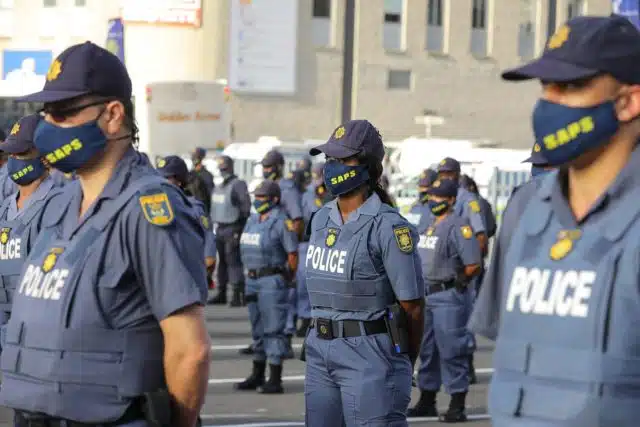
The South African police’s long list of failures
The South African Police Service (SAPS) presented a long list of missed targets this week, flagging growing cases of irregular and wasteful expenditure, a growing backlog of DNA processing, and major underperformance from its detective units.
The group, operating under the Department of Police, presented its annual report to the portfolio committee on police on Wednesday (12 October).
One of the stand-out figures in the report came from irregular expenditure at the department, which increased by 352.6% since 2021, among others.
While the presentations submitted during the meeting included some police and Hawks successes, these were overshadowed by the lack of targets met by the SAPS over the 2021/2022 financial year ending March 2022.
This underwhelming performance of the South African police service has come at a time when the department’s actions have been put under the spotlight amid reports of high murder rates in Cape Town, firearm robberies at eight police stations, and the recent killing of a German tourist last week.
The most concerning aspects of the SAPS annual report, predetermined objectives 2021/2022 are summarised below.
The alarming increase in irregular expenditure
According to the report, cases of irregular expenditure have increased by 352.6% from 19 confirmed incidents in 2021 to 89 incidents in 2022 – amounting to around R152 million.
“The increase is due to long outstanding cases that were finalised and confirmed after a thorough consultation and intervention with end-users, and not due to new cases,” the department said.
It was also noted that fruitless and wasteful expenditure incidents increased by 191%, from 36 incidents in 2021 to 105 in 2022.
The department said that the majority of wasteful expenditure cases resulted from interest payments for claims against the state, provinces, and divisions that incurred penalties on licence fees.
The rest followed from paying the wrong suppliers, resulting in “monies being spent that could have been used for increasing the capacity of the SAPS or acquiring critical equipment.”
However, it was added that an amount of R285,745 was recovered.
DNA backlog
Another worrying statistic was the amount of biological DNA intelligence case exhibits processed during the financial year.
Of the 252,428 cases recorded, 22,244 were processed, representing only 8.78% of cases being finalised.
This was an obvious shortfall considering the department’s set target of 80% processed within 90 calendar days.
Included in the reasons as to why the process statistic was so low, the report stated that the administration system was “not configured to process case files, in bulk”.
Other reasons included another system being inoperative, meaning that statistical reports could not be printed for several days. Additionally, the presentation said that for two months, there had also been a lack of “spin columns” that were used to process semen samples in gender-based violence and femicide cases.
Worst performing division
Detectives are meant to be the specialists and those that investigate crimes and contribute to successful prosecutions, but parliament heard this is the ‘worst performing’ division in the police.
“The worst performing programme was the Detective Service Programme, with a total number of 29 performance targets and an achievement rate of 51.7%,” the report said.
According to the report, the underperformance was recorded in the following aspects:
- Overall detection rates;
- Organised crime – including reduction of drug syndicates and organised criminal groups and gangs;
- The percentage of results of trial updated in respect of guilty and not guilty verdicts; and
- The generation of previous conviction reports and all forensic evidence-related targets.
Another issue outlined by the presentation was that the firearms reported lost or stolen over the financial year came to 712.
This was a result of “the escalation of crime against members, including, but not limited to, robbery in townships, housebreaking, theft from dwellings, as well as negligence by members,” the report stated.
Read: Government’s big plan to save South Africa’s army has blown up in its face



